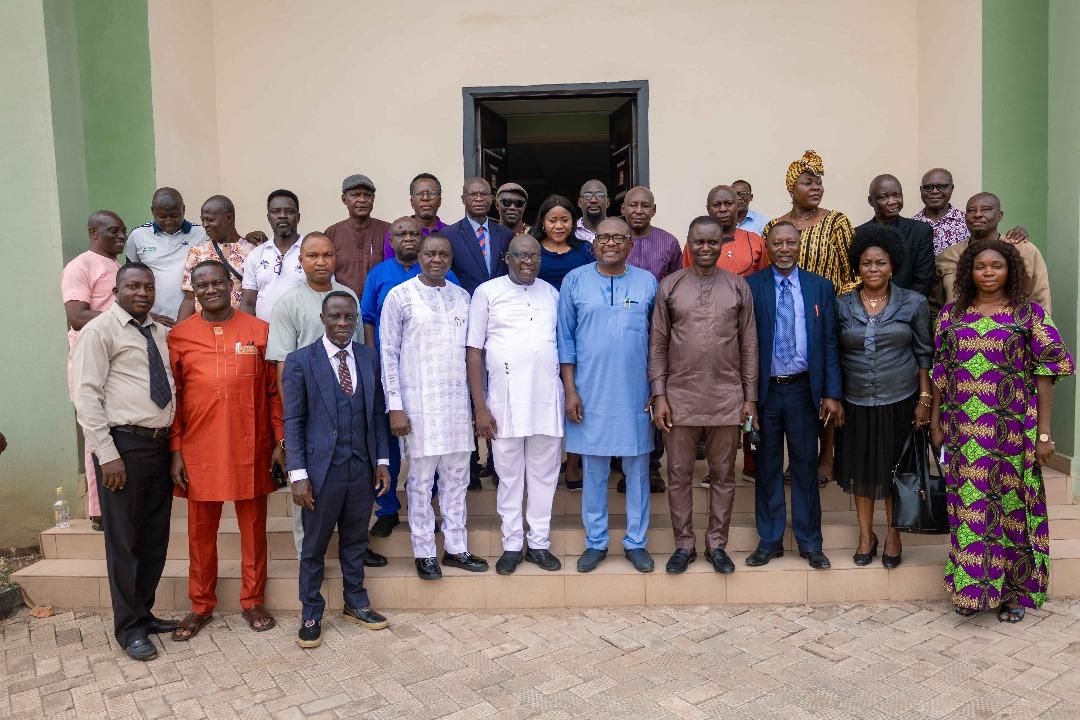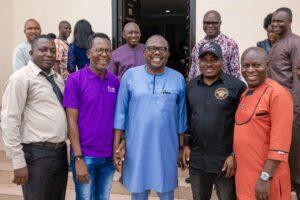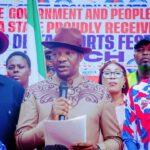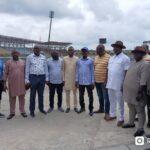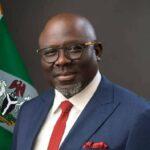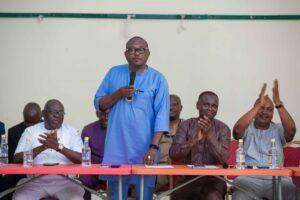
The great America author, Thomas Vachss, once said “journalism is what maintains democracy. It is the force for progressive change.”
Joshua Oppenheimer, the Oscar-class film director, renowned for his “The Look of Silence” and “The Act of Killing”, put it in a clearer perspective.
“The function of journalism is to uncover vital new information in the public interest and to put that information in a context so that we can use it to improve the human condition,” he wrote.
It therefore goes without saying, that any government passionate about the advancement of its society would necessarily support the development of journalism for its success and for the progress of its people.
That is exactly what the Delta State Governor, Rt Hon Sheriff Oborevwori, has set out to do, beginning from upscaling the state owned media organizations and stretching to supporting practitioners of the profession in the state.
The plan which has been activated by the setting up of a high-powered committee on the revival of the state owned media houses also includes the retraining of journalists, improvement of their welfare and provision of greater and freer access to information from various sectors of the government.
This was disclosed by the Delta State Commissioner for Information, Dr Ifeanyi Osuoza, during the congress of the Delta State Council of the Nigeria Union of Journalists which he attended to interact with the members, last Thursday.
According to him, Governor Oborevwori has set up a very high powered committee to look into the problems of the state media organisations which includes DBS Asaba, DBS Warri and the Pointer newspaper, with a view to revamping and repositioning them to be more competitive in the national and global media space, and to serve the people better.
The committee is composed of the Secretary to the State Government, Dr Kingsley Emu, the Commissioner for Economic Planning, Dr Sonny Ekedayen, the Commissioner for Finance, Chief Fidelis Tilijie, the immediate past Commissioner for Information and current Commissioner for Works, Rural and Riverine Roads, Charles Aniagwu, the present Commissioner for Information, Dr Ifeanyi Osuoza, the Chief Press Secretary to the Governor, Olorogun Festus Ahon and celebrated veteran journalist and former Editor of the Vanguard newspaper, Mr Mideno Bayagbon.
The committee is to examine various problems affecting DBS Warri, DBS Asaba and the Pointer, and proffer solutions and recommendations towards their revival and repositioning.
“The problem is not only at DBS Warri. Asaba has the same problems. Pointer has the same problems. So, we are going to tackle the problems together and I can guarantee you that, at the end of the day, Deltans will be impressed by the way we are going to handle it. The Governor gave one week to turn in the report, so that we can find a lasting solution towards revamping our media houses,” Osuoza revealed.
“On the issue of live coverage, I cannot guarantee that they can do so by the first year anniversary, but when we finish the complete overhaul of the facilities in DBS, we can achieve that.
“The equipments are not things you can just go and buy off the shelf. Almost all of them have to be ordered and imported because Nigeria does not produce them and nobody keeps them on the shelf.
On the need for the retraining of journalists, the Commissioner pointed out that it is critical to the advancement of journalism in the state and there is already a plan in the offing.
“I can tell you that there is already a detailed proposal towards the training of journalists in Delta State. The training is very key, very critical, because there are new trends in journalism. New Media has turned everything around, so let the conventional journalists learn, get trained and follow the new trends. It will assist them and it will assist the organisations that they represent.”
Osuoza said that high up in his mind also is the welfare of journalists.
“The primary thing I will be looking into is the welfare of members of the press. Nigeria is going through hard times. The situation affects virtually everybody, the so called “haves and the have-nots,” but from my little understanding of the situation, members of the fourth estate of the realm are affected more.
“The ones that work in publishing companies hardly meet their target in terms of sales of their papers. Even in the broadcasting industry, advertisers do not come any longer. The only people that I feel, somehow, that their heads are still a little bit above the waters are the online publishers. I might be wrong but that is my assessment.
“So, in totality, I will take the welfare of the members of the press seriously. By welfare, I mean things (institutional support) that you people are used to before now. I will not abrogate them, instead I will add more.
“This government is people friendly. The Governor is passionate about relieving our people from some of these hardships that we are going through. And when I make comments like this those who me know can take it to the bank. I don’t play politics with things like this.”
To this end, Osuoza promised to visit the various chapels of the Delta NUJ to attune the government to their needs and offer possible support.
“I will be making some visits to the chapels in the course of the year. I may not have the luxury of time to visit them one after the other, so the chapels in Warri, Ughelli, Sapele, Isoko and others in that axis, I will possibly meet them in Warri. For the Asaba and Agbor axis, I will meet them in Asaba.
“I am also fully committed to the Happy Hour programme of the NUJ Council, because after a hard day’s job, we have to chill and interact in a convivial atmosphere.”
In this regard, he graciously offered to host and sponsor the next edition of the programme.
On free and easy access to information from the government ministries, departments and agencies, Osuoza encouraged the journalists to freely go up to the commissioners to seek any information they need while he also assured that the Governor will interact with them at an appropriate time, and that the programme of periodic ministerial briefing will be reintroduced in the course of the administration.
“It might not be quarterly at this time but, definitely, we will create time for the Governor to interact with the media.
“I am an apostle of ministerial press briefing because it affords the ministries to interact and to tell the people what they are doing, so the media can capture it first hand. But I believe it is premature for now.
“Let’s finish the one year anniversary then we can arrange for the commissioners to appear before you and talk to you. But in the interim, everybody has the right to access any commissioner to ask questions on anything you are investigating or you feel you need to get information on.
“You can approach any of the commissioners and if you have any problems when you get there, you can call me and I can come over or speak with them. That will make everybody’s job easier.”
Part of the measures to also open up greater access for journalists include sticking to professional information flow system by making the Public Relations Offices in the ministries more effective, Osuoza said.
“Now, virtually all or most of the commissioners seem to have come with their own media team, media in quote because, nowadays, anybody that has a Facebook account or publishes something on Facebook is seen as a journalist. That is the present reality we find ourselves.
“Some of these persons are those that have been engaged to run the publicity affairs of the ministries, but it is always best to use the best hands, to use professionals to handle publicity, and all our PROs are professionals and they are well trained.
“We will not stop them from using their Facebook people in publishing their activities but they must use the PROs assigned legitimately to the ministries. With them, you can arrange interviews with the Commissioners.”
Osuoza however cautioned that not all comments or responses from government appointees should be regarded as an official policy statement of the government.
“The persons that have the right to make such statements are the Secretary to the State Government, the Commissioner for Information and the Chief Press Secretary to the Governor. But you can approach a Commissioner to tell you what is happening in his ministry, but that is not making policy statements on behalf of the government. They are two different things.”
Osuoza also charged the members of the council to cooperate with the government by focusing on responsible journalism through upholding the ethics and tenets of the profession.
“Please let’s do things that will ensure that Delta progresses. When you see positive things, please let’s report them. Unlike negative reporting, let’s always hear the other side of the story. There is nothing as bad as when you take a story from one angle and you didn’t hear the other side. That means you have lost the balancing aspect of reporting a story.”
“I would like to crave your indulgence to please cooperate with the government. Any areas where you have doubts, you can call me, I am just one phone call away, or you can access me through the office to make clarifications.
“Please do not go into conjecture. Be professional in your reportage and the way you handle things involving the state. For those that are from Delta State, Delta State belongs to all of us. For those that live in Delta, Delta State belongs to all of us. There is no discrimination as to where you are from, as long as you call Delta home.”


